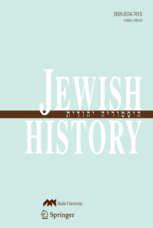
Jewish History
Scope & Guideline
Connecting Communities Through Historical Insights
Introduction
Aims and Scopes
- Historical Analysis of Jewish Communities:
The journal focuses on the detailed historical examination of Jewish communities, their cultural practices, social dynamics, and interactions with surrounding societies throughout history. - Legal and Jurisprudential Studies:
A significant emphasis is placed on the legal history of Jewish law, including its codification and the interpretation of historical legal texts, revealing the evolution of Jewish legal thought. - Cultural and Religious Interactions:
The journal explores the intersections of Jewish culture with other cultures and religions, analyzing how these interactions have shaped Jewish identity and practices over time. - Focus on Manuscript Studies and Textual Analysis:
There is a strong emphasis on the study of manuscripts, texts, and their marginalia, contributing to understanding the historical context and the transmission of Jewish knowledge. - Exploration of Marginalized Voices:
The journal aims to highlight lesser-known narratives within Jewish history, including those of women, marginalized communities, and less prominent historical figures.
Trending and Emerging
- Interdisciplinary Approaches to Jewish Studies:
There is a growing trend towards interdisciplinary methodologies, incorporating insights from fields such as social science, cultural studies, and legal theory to enrich the understanding of Jewish history. - Focus on Gender and Identity:
Emerging themes increasingly highlight gender studies and the construction of Jewish identity, reflecting a broader trend in humanities scholarship that seeks to understand the roles of gender in historical contexts. - Responses to Historical Trauma:
Recent publications show an increased focus on the impact of historical traumas, such as the Holocaust and other forms of persecution, on Jewish identity and memory, indicating a shift towards contemporary relevance in historical narratives. - Global Perspectives on Jewish History:
The journal is increasingly incorporating global perspectives, examining Jewish experiences in diverse geographical contexts, which broadens the scope of Jewish history beyond Eurocentrism. - Legal History and Jewish Law:
There is a notable increase in scholarship related to the history of Jewish law and its implications for contemporary legal issues, reflecting a growing interest in the intersections of law, culture, and history.
Declining or Waning
- Traditional Historical Narratives:
There appears to be a declining focus on traditional narratives of Jewish history that emphasize a linear progression or singular national identity, as scholarship increasingly embraces complexity and diversity. - Studies on Early Modern Jewish Mysticism:
Although once a vibrant area of research, themes specifically centered on early modern Jewish mysticism are less frequently addressed, indicating a potential waning interest in this niche within broader Jewish historical studies. - Economic Histories of Jewish Communities:
Research focusing on economic aspects of Jewish life, such as trade and finance, is appearing less frequently, suggesting a shift toward more culturally and socially oriented studies.
Similar Journals
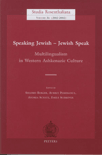
STUDIA ROSENTHALIANA
Contributing to the Legacy of Jewish Historical InquirySTUDIA ROSENTHALIANA is a distinguished journal published by Amsterdam University Press, specializing in the interdisciplinary study of Jewish culture and history, particularly as it relates to the field of Rosenthaliana, encompassing literature, art, and historical scholarship. With a robust academic legacy dating back to its inception in 1970, the journal has evolved through various publication phases, maintaining a commitment to fostering scholarly discourse and disseminating significant research. Although it does not currently participate in an open access model, STUDIA ROSENTHALIANA continues to contribute invaluable insights to the fields of Jewish studies, cultural analysis, and historical research. Researchers, professionals, and students can benefit from its comprehensive essays, critical reviews, and analytical studies that enrich our understanding of Jewish heritage and modern implications. The journal's influence and relevance in its field make it an essential resource for anyone invested in contemporary debates and analyses concerning Jewish culture and identity.
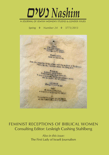
Nashim-A Journal of Jewish Womens Studies & Gender Issues
Advancing Scholarship on Gender Issues in Jewish ContextsNashim: A Journal of Jewish Women's Studies & Gender Issues, published by Indiana University Press, stands as a pivotal platform for interdisciplinary scholarship at the intersection of Jewish studies, gender studies, and cultural discourse. With an ISSN of 0793-8934 and e-ISSN 1565-5288, this journal offers a vital repository of research and critical analysis, specifically highlighting the experiences and contributions of Jewish women across historical and contemporary contexts. Although classified in Q4 of the 2023 category quartiles for Arts and Humanities, Cultural Studies, and Gender Studies, it serves to amplify underrepresented voices and themes that are crucial for understanding societal dynamics. The journal spans from 2013 to 2024 and welcomes contributions that engage thoughtfully with gender issues in Jewish contexts, making it an essential resource for researchers, educators, and students alike, who are dedicated to exploring the rich complexities within this field of study. While Open Access is not currently supported, access to its in-depth articles can be sought through institutional databases and libraries, ensuring that its impactful research reaches those who seek it.

Zutot
Connecting Ideas in Arts, Humanities, and BeyondZutot is a distinguished academic journal published by BRILL, focusing on the multifaceted realms of Arts and Humanities, Cultural Studies, and Religious Studies. With ISSN 1571-7283 and E-ISSN 1875-0214, Zutot presents an invaluable platform for scholars seeking to explore innovative ideas and interdisciplinary approaches within these fields. Recognized within the Q4 category for its contributions to contemporary discourse, the journal ranks at the 44th percentile in Religious Studies and the 39th percentile in General Arts and Humanities, underscoring its relevance and the quality of research it publishes. Since its inception, Zutot has continued to facilitate critical dialogue and scholarship, thus acting as a crucial resource for researchers, professionals, and students alike. Its converged publication years from 2001 to 2004 and 2008 to 2024 further demonstrate its ongoing commitment to supporting rigorous academic inquiry.

Judaica Bohemiae
Unveiling the Nuances of Jewish Existence in BohemiaJudaica Bohemiae, published by the Zidovske Muzeum Praze, is a prominent scholarly journal dedicated to the study of Jewish culture, history, and religious practices, with a particular focus on the Czech Republic and Central Europe. Since its relaunch in 2007, the journal has established itself as a valuable resource in the fields of Cultural Studies, History, and Religious Studies, achieving a commendable Q2 ranking across these disciplines in 2023. With its thoughtful compilation of research articles and critical essays, Judaica Bohemiae offers insights into the evolving dynamics of Jewish existence and identity. Although it does not currently operate under an open access model, the journal ensures that its high-quality content remains accessible to researchers, professionals, and students interested in the nuanced intersections of culture and history. By promoting rigorous academic discourse and advancing the understanding of Jewish heritage, Judaica Bohemiae continues to play a crucial role in its field, fostering scholarly connections and illuminating the past for future generations.

Kwartalnik Historii Zydow-Jewish History Quarterly
Unveiling the Complexities of Jewish HistoryKwartalnik Historii Żydów - Jewish History Quarterly is a dedicated academic journal published by the esteemed Jewish Historical Institute in Warsaw, Poland. With an ISSN of 1899-3044, this quarterly publication serves as a vital platform for scholarly discourse on Jewish history, culture, and heritage. The journal aims to reflect the diversity and complexity of Jewish experiences across historical contexts, making it an essential resource for researchers, professionals, and students in the fields of History, Religious Studies, and Cultural Studies. Despite its recent coverage discontinuation in Scopus from 2012 to 2015, the journal's rankings within its respective categories indicate a modestly engaged readership and potential for contribution, particularly seen in its ranks of 339/388 in Religious Studies and 859/975 in History. Although the journal operates on a non-open access basis, its curated articles enrich the understanding of Jewish narratives and interactions within broader socio-cultural frameworks, underlining its importance in promoting historical knowledge and cultural appreciation.

Jewish Studies Quarterly
Illuminating the Rich Tapestry of Jewish StudiesJewish Studies Quarterly, published by MOHR SIEBECK, is a leading academic journal dedicated to advancing scholarship in the field of Jewish studies. With its ISSN 0944-5706 and E-ISSN 1868-6788, this journal provides a platform for rigorous research that explores various dimensions of Jewish history, culture, religious practices, and contemporary issues. Although it does not currently offer open access options, it remains an essential resource for researchers, professionals, and students seeking insightful analysis and academic discourse. The journal is widely recognized for its commitment to excellence and contribution to understanding Jewish identities within global contexts. Located in Tübingen, Germany, Jewish Studies Quarterly is integral to the dialogue and scholarship surrounding Jewish thought and heritage, making it a vital reference point in the academic community.

Quest-Issues in Contemporary Jewish History
Advancing Knowledge in Modern Jewish Historical DiscourseQuest - Issues in Contemporary Jewish History is a pivotal open-access journal published by the Fondazione Centro Documentazione Ebraica Contemporanea in Italy. Since its inception in 2010, this journal has been dedicated to the scholarly exploration of the multifaceted dimensions of contemporary Jewish history, making significant contributions to the fields of history and cultural studies. With an ISSN of 2037-741X, it serves as a vital platform for researchers, professionals, and students alike, providing access to an array of insightful articles and research findings. As of 2023, it holds a respectable Q3 ranking in the History category within Scopus, indicating its growing influence in academia, alongside a rank of #899 out of 1760 in Arts and Humanities – History. This makes it an essential resource for those looking to deepen their understanding of Jewish history in a contemporary context. The journal, with its rich scholarly outputs converging from 2017 to 2023, is based in Milan and strives to foster high-quality research in Jewish studies.
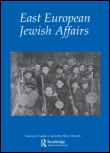
East European Jewish Affairs
Exploring the Rich Tapestry of East European Jewish HeritageEast European Jewish Affairs is a prominent scholarly journal published by Routledge Journals, Taylor & Francis Ltd, dedicated to exploring the intricate historical, cultural, and political dynamics of Jewish communities in Eastern Europe. With ISSN 1350-1674 and E-ISSN 1743-971X, this journal has been a critical platform for academic discourse since its inception in 1992, resuming publication after a hiatus in 2005. Although it is not an open-access journal, it provides vital insights into Jewish studies, engaging researchers, professionals, and students alike with in-depth analyses and discussions. The journal currently holds a Q4 ranking in multiple categories, including Cultural Studies, History, and Political Science and International Relations, reflecting its niche yet significant contribution to these fields. The 2023 Scopus rankings position it within the 34th percentile in History and the 10th percentile in Political Science, evidencing its specialized focus and the evolving nature of Jewish studies. For those investigating the unique social and cultural trajectories of East European Jewish communities, East European Jewish Affairs serves as an essential resource.
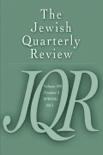
JEWISH QUARTERLY REVIEW
Cultivating Critical Perspectives on Jewish LifeJewish Quarterly Review, published by University of Pennsylvania Press, is a distinguished academic journal that delves into the multifaceted realms of Jewish culture, history, and religious studies. With a rich publication history dating back to 1953 and an impressive track record of rigorous scholarship, this journal maintains a Q2 ranking in key categories such as Cultural Studies, History, and Religious Studies in 2023, placing it among the top-tier journals in its field. The ISSN number 0021-6682 and the E-ISSN 1553-0604 ensure that its scholarship is widely accessible and traceable in academic databases. While the journal is not open access, it remains an essential resource for researchers, professionals, and students seeking in-depth analysis and perspectives on Jewish thought and heritage. The JQR is known for its editorial commitment to enhancing understanding and dialogue across cultural and historical contexts, making it an invaluable asset for anyone engaged in Jewish studies and related disciplines. With its headquarters in Philadelphia, PA, the journal continues to foster scholarly engagement and critical discourse on Jewish identity and experience through its carefully curated articles and reviews.

European Journal of Jewish Studies
Exploring the Rich Tapestry of Jewish Identity and CultureEuropean Journal of Jewish Studies is a distinguished academic publication that offers a comprehensive platform for scholarly inquiry into Jewish studies, addressing critical intersections with cultural studies, history, literature, and religious studies. Published by BRILL, a leading academic publisher based in the Netherlands, this journal boasts a robust reputation supported by its impressive rankings and quartile classifications—Q3 in Cultural Studies, Q3 in History, Q2 in Literature and Literary Theory, and Q3 in Religious Studies as of 2023. With its convergence years spanning from 2007 to 2024, the journal serves as a vital repository of research that navigates the complexities of Jewish identity and culture through interdisciplinary lenses. Although it does not operate under an open access model, the journal's rigorous peer-review process ensures the publication of high-quality research essential for students, professionals, and academics alike. Engaging with this journal opens up pathways for critical dialogue and innovative contributions to the field, making it an essential resource for those invested in the rich tapestry of Jewish studies.